How to market music using Facebook Messenger
Once you’ve got a few solid songs tucked away and are ready to start promoting your music, one extremely effective option – particularly if you’re on a budget – is running a Messenger ad campaign.
By Michael Walker of CDBaby’s DIY Musician Blog

So you’ve already recorded at least one quality song and you’ve released it to the world.
Now what? How can you actually build a loyal audience and earn a sustainable income?
One music marketing method proving to be extremely successful, especially on a budget, is running a Messenger ad campaign.
What is Virtual Tour Hacking?
A novel concept for most DIY artists is “virtual tour hacking,” a term I coined for Modern Musician.
In a nutshell, it involves running a Messenger campaign ad for as little as $3 a day to send traffic directly to your Messenger inbox. Once there, a potential new fan can listen to one of your songs and have a conversation with you.
You are making an immediate, personal connection with someone who will resonate with your music (if you’re using the right targeting for your ads).
The idea is to get “in tune” with the right fans. For example, if you’re a country artist targeting heavy metal fans they might not necessarily resonate with your music, so we need to “tune up” your targeting.
Why use a Messenger campaign?
- Motivation: You’ll start getting messages every day from new fans about how your music is actually impacting them. This kind of engagement is much more meaningful than paying to send listeners to streaming platforms (where they can’t communicate with you directly).
- Targeting: Having conversations with your fans is the best way to get “in tune” with your audience targeting (more on this later) and helps you to understand your audience directly, which gives you direct feedback about if they’re a true fan or not.
- Sales: Building personal fan engagement will allow you to make more sales, especially “higher ticket” offers ($1K+ per sale). When you have personally connected with a fan, it becomes more likely that they will be interested in supporting you financially — whether that’s buying your merch, signing up to your inner circle or purchasing a high ticket offer (e.g custom song, house concert).
Here’s our step-by-step guide on how to launch your own Messenger campaign.
Step 1: Target Your Ideal Super Fans
Before we set up your Messenger campaign, make a list of who you’re going to target. For example, if you think you’re a similar artist to Taylor Swift, you’ll want to target Taylor Swift fans because they’ll probably like your music too.
1.) Make a list of EVERY artist you resonate with using the following criteria:
- Who has fans who would like your music?
- Who would you love to tour with?
- Who’s influenced your music most?
2.) Use this free music map and type in the name of your favorite artist to generate a list of all of the similar artists to them. For example, if you’re a Coldplay fan, you’re also really likely to be a Muse fan. Add these to your list.
3.) Refine your list to your Top 10 artists you’d like to start with targeting.
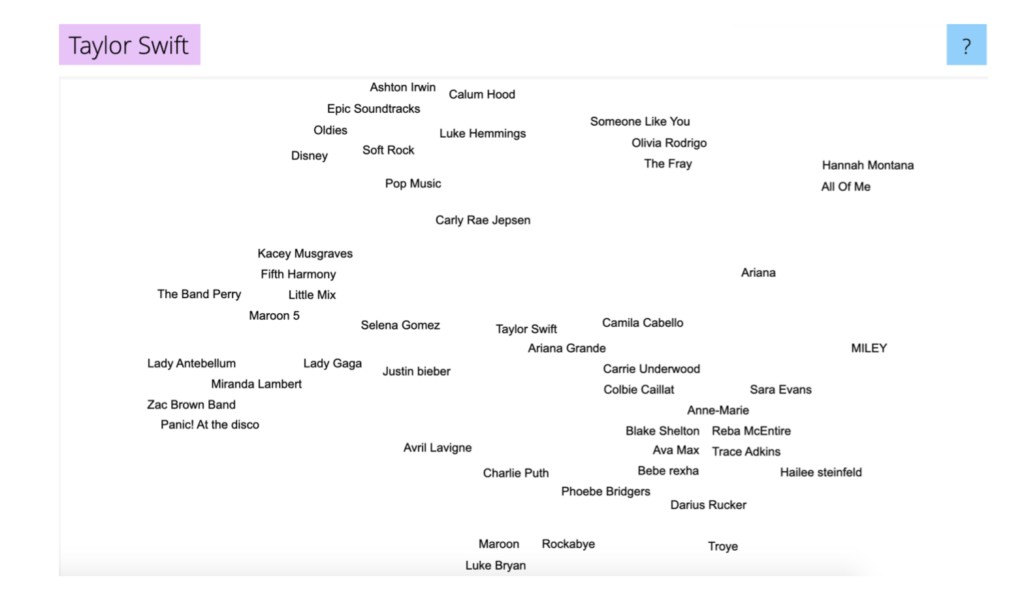
Step 2: Create Your Intro Video
This will be the video we use for your ad campaign. Record a 20 to 30 second video introducing yourself and your music (we’ve found that vertical selfie videos produce the best results!).
Here’s a script you can use for your video:
“Hey, my name’s _____, I play in a band called _____. If you like artists like X, Y and Z, I think you might like my music too. Click the send message button below so I can send you a free song.”
Feel free to get as creative as you like with your video, but keep in mind it encapsulate your artist brand and personality.
Step 3: Create Your Business Manager Account
We’ll be launching your ad by using Facebook Business Manager so if you haven’t already, here’s how to create it:
- Go to business.facebook.com/overview
- Click “Create Account”
- Enter a name for your business, your name and work email address and click “Next”
- Enter your business details and click “Submit”
- Connect your Facebook Page to the business manager
- Add or create an Ad Account in Business Manager
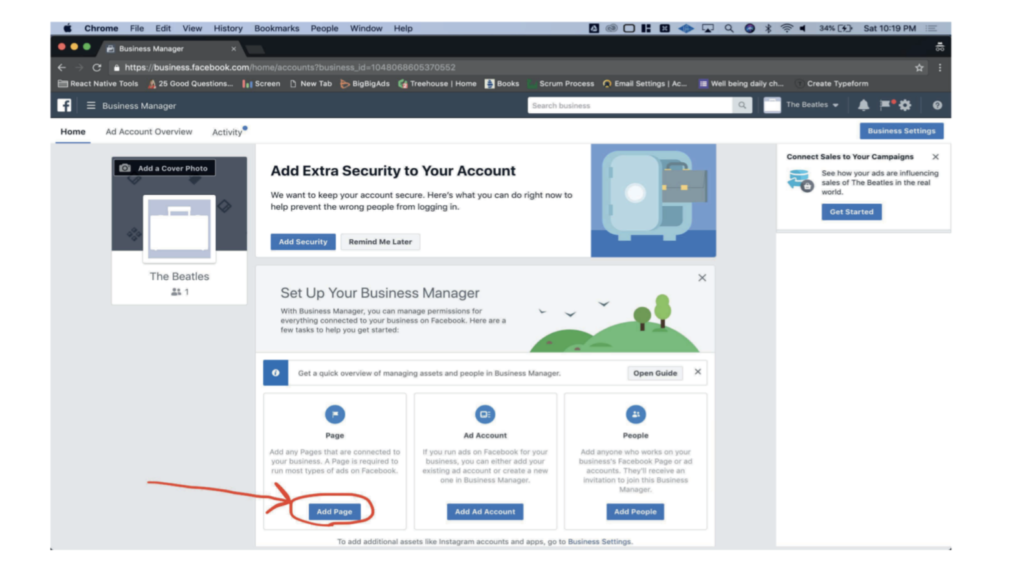
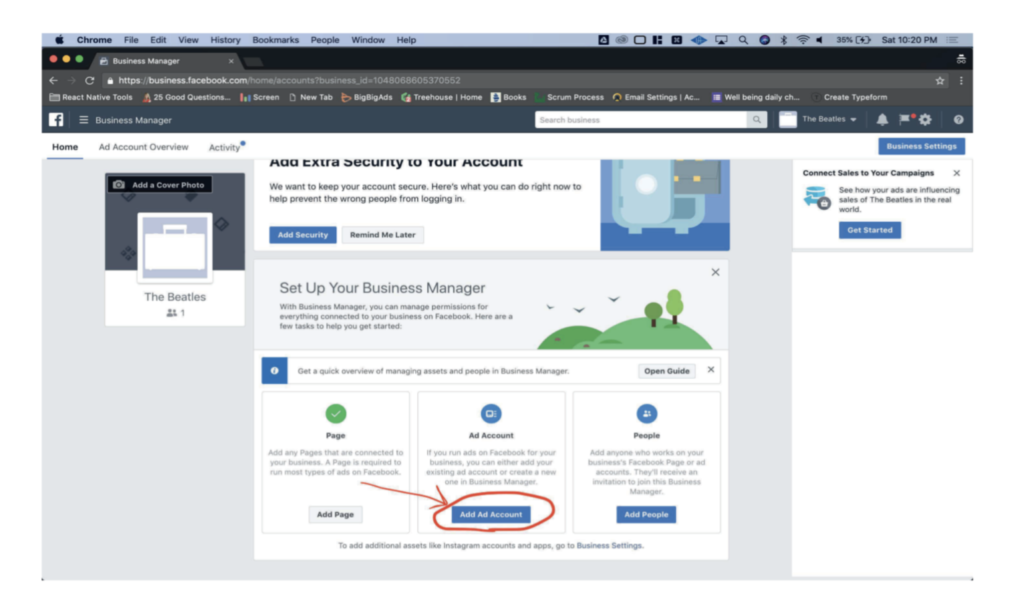
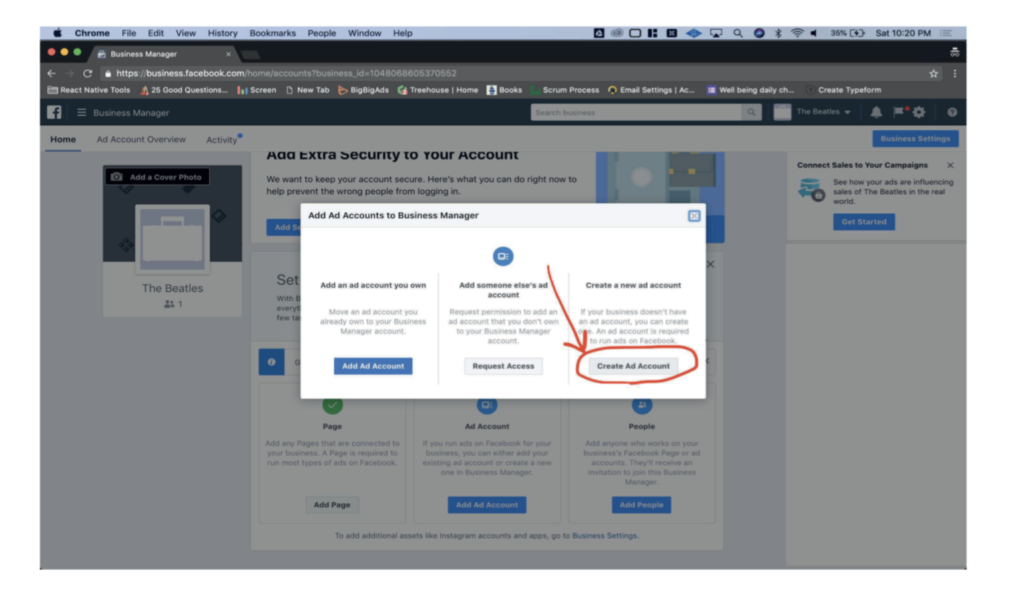
Step 4: Launch Your Campaign
1. Open your Ads Manager.
2. Click “Create” and choose “Messages” as the campaign objective.
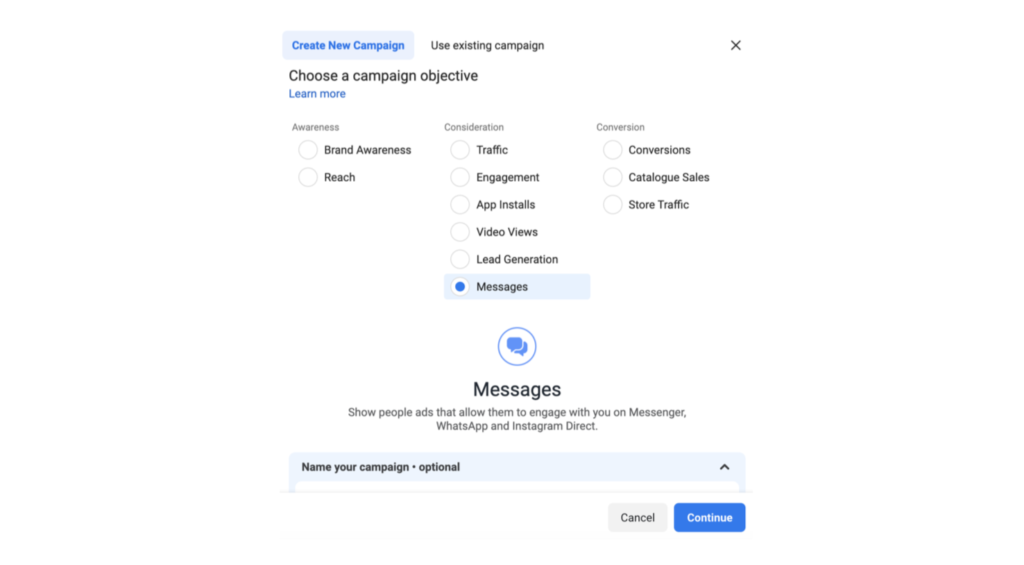
3. Name your campaign and choose the first artist you’re going to target and title the Ad Set level with their name. Then click “Continue” and “Next”.
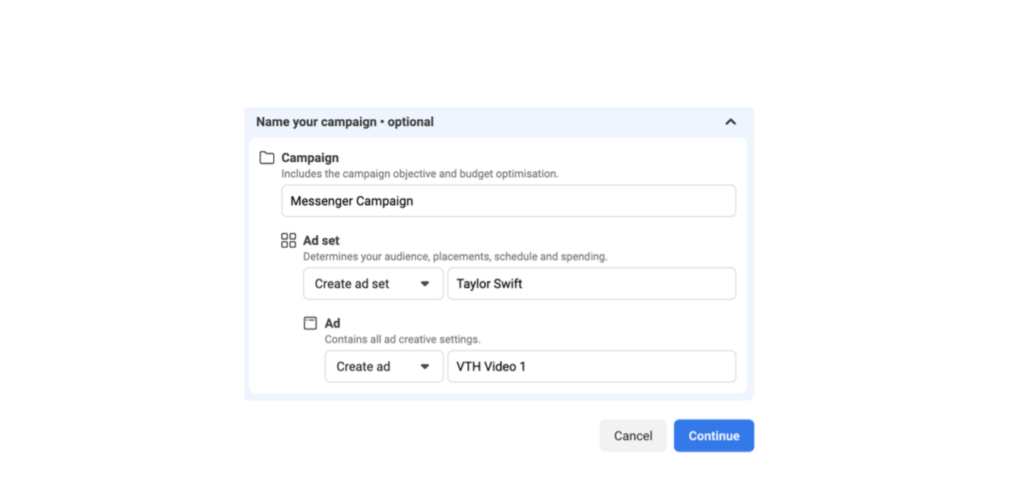
4. Set your budget – we’d recommend starting with $3 a day to make sure the audience is working for you before you start scaling it up.
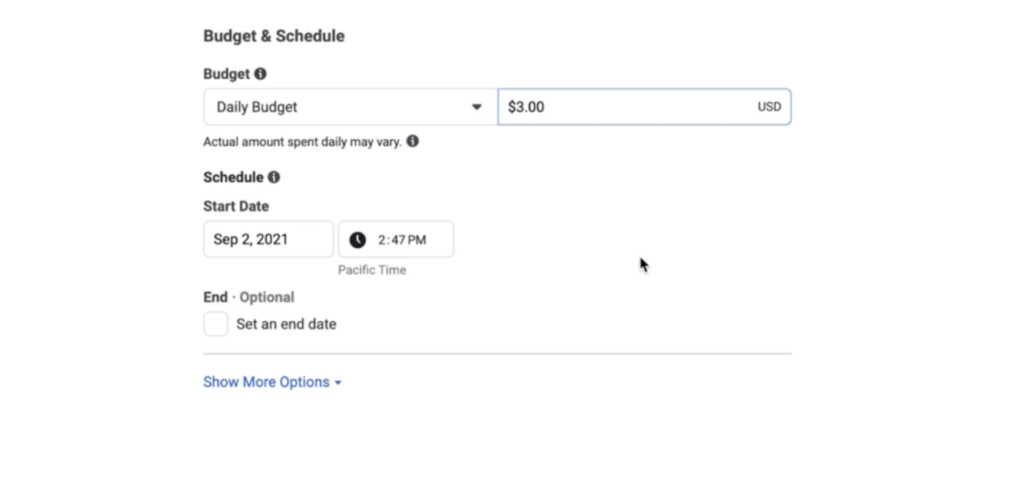
5. Create Your Audience with your target location, age range and set the interests as the artist whose audience you’re targeting. In this example you’re targeting Taylor Swift fans in the US with the age range of 16-40. Then click “Next”.
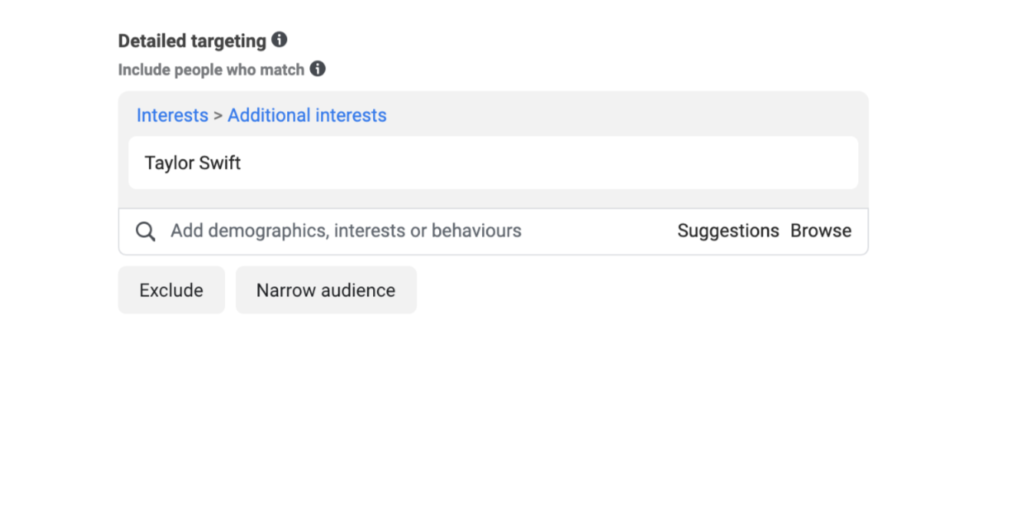
6. Click “Add media” to upload the intro video you created earlier. Then add the primary text and headline using the following copy (you can also tweak it slightly to match your voice):
“If you’re a fan of X, you might like my music too! Click “send message” to hear a song :)”
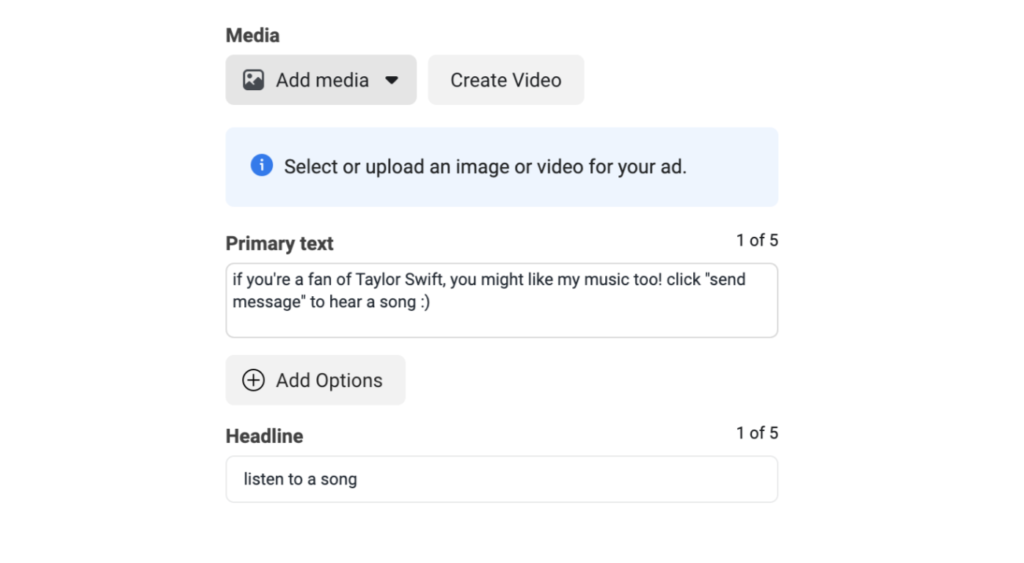
7. Hit Publish! You have officially launched your first Messenger campaign. You should expect to see messages coming in within the first 24 hours.
Step 5: Start having “inTune Conversations”
Now you can start having personal conversations with new listeners, sending them one of your songs and asking for their feedback. If they like your music, you can ask if they’d like to sign up to your private fan community, collect their email or make an offer.
Here’s an example conversation you might have with a new listener:
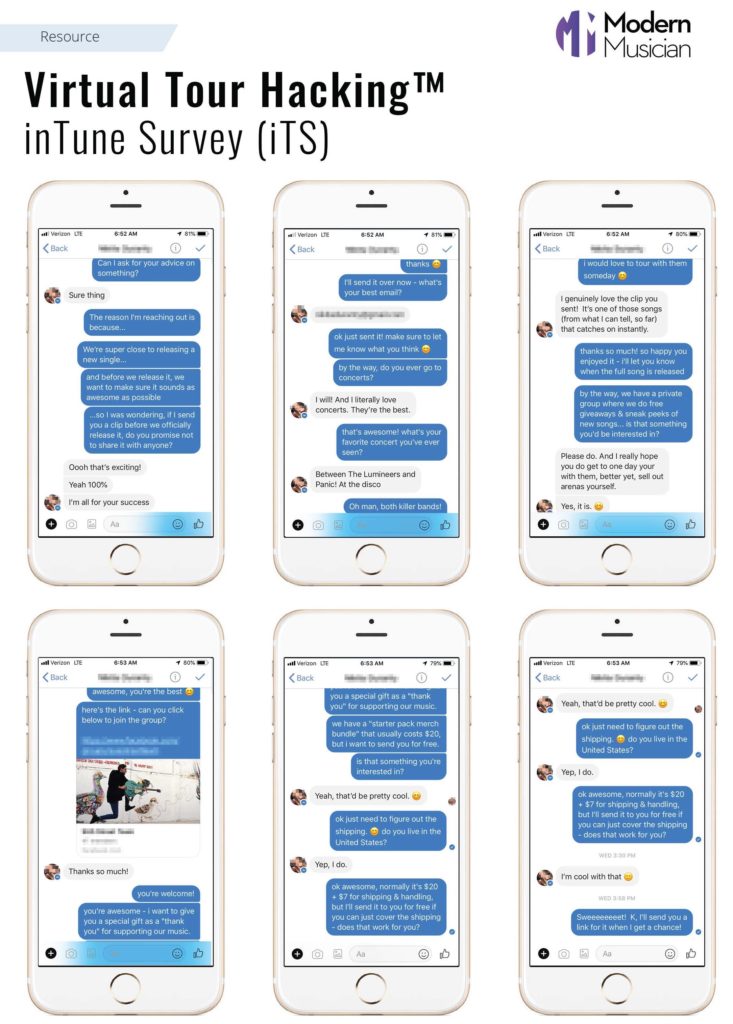
Step 6: Build Your Mailing List
So you have a bunch of new listeners…how do you turn them into superfans? The answer is simple…you need to keep building deeper relationships with those people.
Every artist needs to build a CRM (customer relationship manager), AKA a mailing list. It’s essentially a contact list with names, phone numbers and emails for all of your fans, and also a good CRM will keep track of which fans have purchased things from you so you can stay in closer contact with those people.
After your inTune Conversation, you can ask for your new fan’s email address to add into your CRM. When you’ve released a new song, you can easily send them an email or message to say “Hey, just released a new song! I’d love to hear what you think.”
Unlike your followers on social media, you own your mailing list, so regardless of the unpredictable changes on social media platforms, you’ll always have a fool-proof way of connecting with your fans.
If you want to grow your fanbase and generate new listeners for your music, it comes down to making genuine connections and building relationships. When you put in the time and effort to connect with someone, you’ll usually see it in return.
Now what?
Setting up your Messenger campaign might seem overwhelming at first, especially if you’ve never created your own ads before.
If you’d like more direct support, we created a five-day challenge called 1Fan Challenge where we’ll launch a “Messenger funnel” that generates real fans from scratch, makes predictable income and provides true fan engagement in five days.
Click Here To Join the Challenge!
Michael Walker is leading a revolution in today’s music industry. Having personally reached 17 million views on YouTube, working with Grammy Award-winning producers and touring internationally to perform for hundreds of thousands of fans worldwide – Michael is one of those rare mentors who has actually walked the walk of their own methodology.
Starting out with pure grass-roots techniques, he and his band Paradise Fears went from living out of their cars to selling 24,000 albums in 6 months and reaching #2 on the iTunes Alternative Charts.
Taking his clients through a 3-tier system, Artistic Identity, Passionate Fan Base and Revenue Multiplier; Michael provides artists with the tools necessary to create a lasting career in the music industry.
I’m curious how to send the initial song. Is it too rushed to ask for an email address right off the bat? Perhaps better to send a link and ask what they think ?